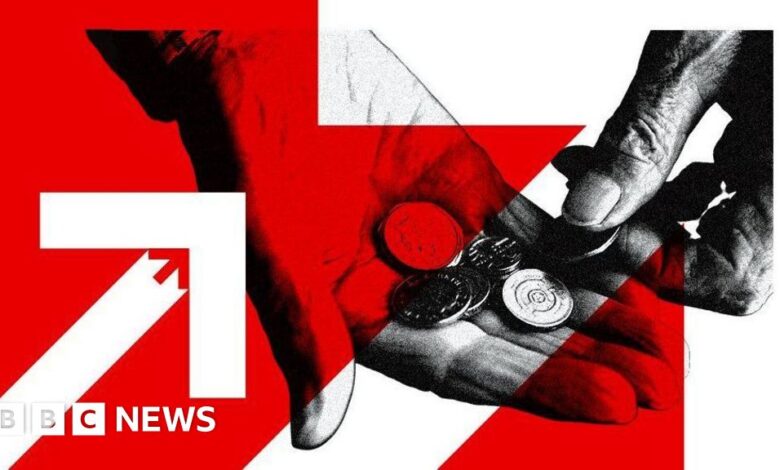How quickly are prices rising?

In the UK, prices rose by 2.6% in the 12 months leading up to March, slightly lower than the previous month but still above the Bank of England’s target. The Bank of England adjusts interest rates to control inflation, and they have cut rates twice in 2025, bringing them down to 4.25%. The Bank had warned of an increase in inflation for the year 2025.
What is inflation?
Inflation is the gradual increase in the price of goods and services over time. For example, if a bottle of milk costs £1 and then increases to £1.05 a year later, the annual milk inflation rate is 5%.
How is the UK’s inflation rate measured?
The Office for National Statistics (ONS) tracks the prices of various everyday items, including food and fuel, to calculate the inflation rate. They use a virtual “basket of goods” that is regularly updated to reflect changing shopping trends. For example, in 2025, virtual reality headsets and yoga mats were added to the basket while local newspaper adverts were removed.
The recent drop in inflation in the UK was driven by a decrease in clothing and shoe prices. The Bank of England also considers “core inflation,” which excludes food and energy prices due to their volatility, to get a better sense of long-term trends. Core inflation was at 3.4% in March, slightly lower than February’s 3.5%.
Why are prices still rising?
Although inflation has decreased since reaching 11.1% in October 2022, prices are still rising, albeit at a slower rate. Inflation spiked in 2022 due to increased demand for oil and gas post-Covid, with energy prices surging further after Russia’s invasion of Ukraine. Higher food prices also contributed to inflation staying above the 2% target.
Why does raising interest rates help lower inflation?
Raising interest rates makes borrowing more expensive, leading to reduced spending and increased savings. This decrease in demand for goods helps slow down price increases. However, increasing borrowing costs can negatively impact the economy by raising mortgage repayments for homeowners and reducing borrowing for businesses.
What is happening with UK interest rates and will they decrease?
The Bank of England cut rates in 2024 and 2025, bringing them down to 4.25%. Governor Andrew Bailey suggested that further gradual cuts could follow as inflation decreases. However, unpredictable global factors like US tariffs could impact the UK economy and inflation rates.
Are wages keeping up with inflation?
Private sector earnings have been increasing more than public sector pay, but the real wage growth has fluctuated in recent years.
What is the situation with inflation and interest rates in Europe and the US?
Eurozone countries have been trying to control inflation, with the European Central Bank cutting interest rates multiple times. In the US, inflation fell to 2.4% in March, above the central bank’s 2% target. The Federal Reserve has held rates steady, despite pressure from President Trump for further cuts.





